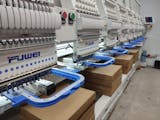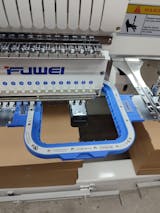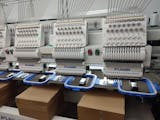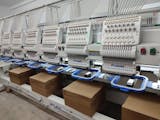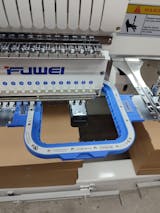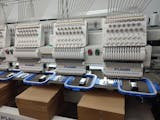1. Introduction: Navigating the Embroidery Design Industry
The embroidery design industry is a vibrant tapestry woven from diverse threads—digitizing specialists, full-service providers, and niche firms—each playing a unique role in today’s creative and commercial landscape. Whether you’re a seasoned embroidery studio owner, a passionate hobbyist exploring embroidery shops, or a business seeking the perfect partner, understanding the industry’s key segments is your first step toward making informed, profitable decisions.
At its core, the industry revolves around a few essential search intents: finding reliable partners for collaboration, comparing service offerings and quality, identifying top-rated companies, understanding pricing models, and evaluating provider reliability. From high-precision digitizing services that transform artwork into flawless stitch files, to full-service providers handling everything from design to bulk production, and specialized firms tackling complex or large-scale projects, the options are as varied as the designs they produce.
As we journey through this guide, you’ll discover how to assess potential partners, compare offerings, and unlock the value that top embroidery design companies can bring to your projects or business. Ready to stitch your way to success? Let’s dive in.
Table of Contents
- 1. Introduction: Navigating the Embroidery Design Industry
- 2. Top Embroidery Design Companies for Business Partnerships
- 3. Comparing Services, Quality, and Industry Offerings
- 4. Top-Rated Companies: Reviews and Reputation
- 5. Industry Expertise: History and Technical Mastery
- 6. Pricing Structures and Cost Optimization Strategies
- 7. User Reviews and Real-World Performance Insights
- 8. Conclusion: Selecting Your Ideal Embroidery Partner
- 9. FAQ: Embroidery Design Company Partnerships
2. Top Embroidery Design Companies for Business Partnerships
The embroidery design landscape is brimming with companies eager to collaborate, each bringing distinct strengths to the table. Whether your needs center on flawless digitizing, comprehensive production, or specialized solutions for large-scale projects, the right partnership can elevate your brand and streamline your workflow.
2.1 Software and Digitizing Specialists
For businesses that demand precision, scalability, and the best digitizing software for embroidery technology, software and digitizing leaders stand out as indispensable partners.
Wilcom is widely regarded as the industry’s gold standard, seamlessly blending advanced software with professional digitizing services. Their platform empowers users to create intricate, machine-ready files, while their expert team ensures every design—be it a simple monogram or a complex artwork—is converted with meticulous accuracy. Wilcom’s reputation for quality and innovation makes them a go-to for high-volume, professional-grade embroidery projects.
Absolute Digitizing focuses exclusively on digitization, offering reliable conversion of artwork into machine-readable formats. Their team’s attention to detail ensures even the most complex logos or artistic pieces are rendered with precision, making them ideal for businesses that want expert digitizing without investing in software infrastructure.
Design Musketeer rounds out the field with comprehensive digitizing services, leveraging sophisticated tools to optimize stitch types, density, and direction. Their technical approach guarantees that designs translate beautifully across a variety of fabrics, minimizing production headaches and ensuring consistent results.
These specialists are perfect for collaborations where high-precision digitizing is non-negotiable—think branded apparel, intricate logos, or any project where stitch quality defines the final product.
2.2 Full-Service Custom Embroidery Providers
If you’re seeking a partner to handle everything from design conception to bulk production, full-service providers offer an all-in-one solution.
Underground Printing, headquartered in Michigan, is a powerhouse in custom embroidery. Their services span from single-item orders to large-scale production, with a focus on quality control and personalized service. Clients benefit from free design assistance, a broad product range, and the assurance that every order is reviewed and produced by real people—not just automated systems. While premium brands may come at a higher price, the value lies in their comprehensive support and consistent results.
EmbroidMe operates on a franchise model, boasting over 300 locations worldwide. Founded in Florida, they deliver integrated services—embroidery, screen printing, and promotional products—across industries like corporate apparel and team uniforms. Their expansive network means local accessibility and standardized service, making them a compelling choice for businesses looking to scale or explore franchise opportunities.
Stitch America, based in Texas, specializes in custom embroidery with in-house graphic design support. Their experienced teams serve a wide range of clients, from schools to non-profits, and their satisfaction guarantee and quick turnaround times make them a reliable partner for ongoing needs.
These providers excel at end-to-end project management, offering everything from creative design to logistics, and are especially valuable for businesses that want a seamless, hassle-free experience.
2.3 Specialized and Industrial-Scale Partners
When your project demands expertise in complex designs or the capacity to fulfill massive orders, specialized and industrial-scale companies are your best allies.
K-5 Solutions distinguishes itself with contract embroidery solutions focused on precision, efficiency, and craftsmanship. Their state-of-the-art technology and customizable workflows cater to bulk orders, specialty embroidery, and rapid turnaround requirements. Notably, their commitment to energy-efficient machinery and sustainable practices appeals to environmentally conscious partners.
Qualität s.r.o. brings heavyweight credentials to the table, with over 35 years of experience and the ability to process up to 5,000 pieces per day. Based in Slovakia and serving clients across Europe—including Mercedes and Airbus—they rely on advanced TAJIMA technology to deliver industrial-scale quality and reliability. Their expertise makes them a top choice for brands seeking international expansion or large-volume production.
Sunny Side Ink offers a unique twist as a brand partnership facilitator, providing custom embroidery, screen printing, laser engraving, and promotional product sourcing. Their tailored approach is ideal for co-branded product lines, exclusive promotions, and special events, with perks like free shipping and custom artwork services.
From boutique specialists to industrial giants, these partners offer the technical know-how and production muscle needed for ambitious, large-scale, or highly customized projects.
3. Comparing Services, Quality, and Industry Offerings
Choosing the right embroidery design company is about more than just price—it’s about finding the perfect fit for your needs, whether that means artisanal craftsmanship, digital convenience, or industrial-scale production. Let’s unravel the key factors that set providers apart.
3.1 Service Categories and Specializations
The embroidery industry divides into several distinct service categories, each tailored to different client needs and project scopes:
- Traditional Custom Embroidery: Companies like Underground Printing and MODAKNITS focus on bespoke, made-to-order services, emphasizing premium materials and meticulous craftsmanship. These providers excel in serving corporate clients, sports teams, and anyone seeking sophisticated, high-quality design execution.
- Print-on-Demand Platforms: Modern players such as Printful, Merchize, and Printify blend embroidery with e-commerce integration. These platforms empower sellers to offer customized products without inventory risk, leveraging automated order processing and fulfillment networks. The trade-off? While they offer scalability and flexibility, quality and turnaround times can vary depending on the provider network.
- Embroidery Digitizing Specialists: Firms like Digital Embroidery Digitizing, Stitch Digitizing, and Embroidery Designs Pro focus exclusively on converting artwork into machine-readable stitch files. Their technical expertise bridges the gap between creative design and flawless production, making them invaluable for designers and manufacturers alike.
Each segment brings its own workflow, client focus, and technological approach. Traditional providers shine in hands-on quality and customization, print-on-demand platforms offer digital ease and scalability, and digitizing specialists deliver technical precision.
3.2 Quality Benchmarks and Performance Metrics
Quality isn’t just a buzzword—it’s the backbone of successful embroidery partnerships. Leading companies distinguish themselves through:
- Stitch Precision: Underground Printing is lauded for meticulous embroidery standards, especially for corporate and sports applications. MODAKNITS, representing the luxury segment, uses top-tier materials and advanced equipment to achieve flawless finishes, with expert digitizers ensuring every detail meets art-quality standards.
- Material Standards: Stitch America and Thread Logic both pride themselves on using high-grade materials and specialized equipment, offering satisfaction guarantees and quick turnarounds without sacrificing quality.
- Satisfaction Guarantees: Many top providers back their work with guarantees, ensuring that if the result doesn’t meet expectations, they’ll make it right—a crucial factor for businesses relying on consistent, high-quality output.
Case studies and testimonials from trade expos and professional reviews consistently highlight the importance of attention to detail, material selection, and in-house expertise in achieving superior results.
3.3 Pricing Models and Value Analysis
Embroidery service pricing can feel like a maze, but understanding the models helps you maximize value:
- Per-Stitch Pricing: Charges based on stitch count, ideal for highly detailed or variable designs.
- Flat-Rate Pricing: A single price per item, regardless of complexity—great for budgeting bulk orders.
- Tiered Pricing: Discounts for higher volumes, rewarding scale and repeat business.
For garment embroidery businesses, optimizing production efficiency is key to reducing costs. That’s where innovations like Sewtalent magnetic machine embroidery hoops come into play. By slashing hooping time by up to 90% and reducing defects by 15%, these tools can dramatically lower your effective service costs—especially in high-volume settings where every minute and every stitch counts.
In summary, the best embroidery design company for you will align with your project’s complexity, your quality expectations, and your budget. By weighing service categories, quality benchmarks, and pricing structures, you’ll be well-equipped to make a choice that stitches together creativity, reliability, and value.
4. Top-Rated Companies: Reviews and Reputation
When it comes to embroidery design companies, reputation isn’t stitched overnight—it’s built thread by thread, project by project. Let’s dive into the industry’s most celebrated names, separating digital design file providers from full-service embroidery companies, and uncover what makes them favorites among professionals and hobbyists alike.
4.1 Top Digital Design File Providers
Digital embroidery design file providers are the unsung heroes behind countless creative projects. Their patterns, fonts, and in-the-hoop projects power embroidery machines around the globe. But which companies stand out from the crowd?
Itch2Stitch leads the pack with its irresistible applique designs and fonts. Customers rave about the “cutest embroidery designs” and “top notch” quality, with regular sales and a generous 40% discount for first-time newsletter subscribers sweetening the deal. Weekly promotional emails keep the inspiration—and savings—flowing, making Itch2Stitch a go-to for both beginners and seasoned embroiderers.
Embroidery Boutique captures hearts with a broad catalog of embroidery designs, fonts, SVG cutting files, and especially their vintage stitched collections. Their pricing is competitive, with designs sometimes dropping as low as $1.70 during sales. Community is a core part of their appeal: customers enjoy a vibrant Facebook group, regular freebies, and the chance to score a free design with every $5 purchase. Reviewers often mention being “obsessed” with their vintage styles and appreciate the strong sense of belonging.
Planet Applique is renowned for its budget-friendly approach, offering periodic 25-cent sales and free machine embroidery designs with qualifying purchases. Their catalog spans embroidery designs, fonts, applique alphabets, and in-the-hoop projects—making it a treasure trove for crafters. Customers are drawn in by the “cute embroidery designs” and the site’s accessibility for those watching their wallets.
Across these platforms, quality is consistently praised—think crisp stitch-outs, creative motifs, and files that play nicely with a wide range of machines. Add in perks like active Facebook communities and regular promotions, and it’s easy to see why these companies are the darlings of the digital embroidery world.
4.2 Highest-Rated Service Providers
If you’re searching for companies that bring designs to life on apparel, hats, or bags, these top-rated embroidery service providers have earned their stripes through stellar reviews and industry accolades.
Embroly shines for its lightning-fast turnaround and customer service that goes the extra mile. Verified testimonials highlight same-day proofs, quick shipping, and a willingness to accommodate last-minute requests or multiple design revisions. Whether it’s a custom sweatshirt needed yesterday or a child’s drawing transformed into wearable art, Embroly delivers high-quality results and peace of mind.
CustomInk is a household name for group and event orders, celebrated for its easy-to-use online design tool, extensive product range, and design assistance services. Recognized as one of the “Best Places to Work” by the Washington Post and the Human Rights Campaign, CustomInk’s reputation for innovation and reliability makes it a trusted partner for teams, businesses, and organizations nationwide.
Underground Printing consistently ranks at the top for its extensive product catalog, free art services, and ability to handle both small and bulk orders. Industry reviews laud its flexibility, comprehensive support, and commitment to quality—qualities that have made it a favorite for everything from school spirit wear to corporate branding.
Other notable mentions include Thread Logic, known for its embroidery-only focus and satisfaction guarantee, and Stitch America, which wins praise for quick turnarounds and nationwide service.
What sets these providers apart? It’s a blend of speed, flexibility, and a customer-first attitude. Quick proofs, clear communication, and an unwavering commitment to satisfaction ensure that every project—no matter how complex—ends with a smile.
5. Industry Expertise: History and Technical Mastery
The embroidery design industry is a living tapestry, woven from centuries of craftsmanship and technological leaps. To truly assess a company’s reliability and expertise, it helps to trace the journey from hand-stitched artistry to today’s digital marvels.
The roots of commercial embroidery stretch back to the 19th century, when pioneers like Jacob Schiess brought Swiss precision to New York, launching the first structured embroidery workshops. The invention of the hand embroidery machine by Josué Heilmann in 1832, followed by shuttle and chain stitch innovations, set the stage for mass production. By the 1870s, Switzerland—especially St. Gallen—had become a global hub, its reputation for quality still echoing in today’s industry standards.
The 20th century ushered in a revolution with Singer’s multi-head embroidery machines and, later, Wilcom’s groundbreaking computerized designs in the 1980s. These advances didn’t just speed up production—they raised the bar for consistency, complexity, and creative potential. Today, companies blend this rich heritage with cutting-edge software, digitizing intricate patterns that can be transferred and stitched with astonishing fidelity.
What does this mean for you as a client? Companies with deep historical roots—often tracing their lineage to Swiss or German traditions—bring a unique blend of old-world artistry and modern technical know-how. They understand the nuances of thread selection (favoring rayon or polyester for durability and vibrancy), fabric compatibility, and the intricacies of digitization.
Modern embroidery firms must also demonstrate digital fluency: proficiency with specialized software for machine embroidery digitizing, the ability to execute complex patterns, and the flexibility to scale from bespoke projects to industrial runs. Regional expertise still matters, too—companies based in historic centers like St. Gallen or Plauen often draw on generations of knowledge, ensuring reliability and a meticulous attention to detail.
In short, the best embroidery design companies are those that have navigated every turn in the industry’s evolution, from the hum of hand looms to the whir of computerized machines. Their mastery is measured not just in years, but in their ability to marry tradition with technology, delivering results that are both beautiful and dependable.
6. Pricing Structures and Cost Optimization Strategies
Embroidery machine cost and service pricing can feel like a maze—full of hidden corners and surprising shortcuts. But with a clear map, you can budget confidently and even unlock savings that make your projects more profitable.
6.1 Pricing Models Demystified
Embroidery companies typically offer several pricing models, each suited to different needs:
- Per-Stitch Pricing: The industry standard for custom jobs, this model charges $1–$3 per 1,000 stitches. It’s ideal for intricate, variable designs and lets you pay for the actual work involved.
- Flat-Rate Pricing: Here, you pay a set price per item—usually $5–$50—regardless of stitch count. This approach simplifies budgeting for bulk or standardized orders.
- Tiered Pricing: Many companies offer discounts as your order volume increases. For instance, a left-chest logo with up to 6,000 stitches might cost $7.75 per item for small runs, dropping to $2.50 for orders of 300+ pieces.
| Stitch Count | 1-10 items | 11-49 items | 50-100 items | 100-299 items | 300+ items |
|---|---|---|---|---|---|
| Up to 6,000 | $7.75 | $4.75 | $3.50 | $2.75 | $2.50 |
| 6,000-8,000 | $8.75 | $5.25 | $4.00 | $3.25 | $2.75 |
| 8,000-12,000 | $10.25 | $5.75 | $4.50 | $3.75 | $3.25 |
| 12,000-14,000 | $10.75 | $6.25 | $5.00 | $4.25 | $3.75 |
But wait—there’s more beneath the surface. Hidden costs can include:
- Digitizing Fees: Converting artwork into machine-ready files often runs $20–$100 per design.
- Setup Charges: Expect $8–$40 per design for initial setup.
- Color-Change Premiums: Adding extra thread colors may tack on $2–$5 per item.
The bottom line? Always request a detailed quote that breaks down these components, so you know exactly where your money is going.
6.2 Cost-Saving Tactics for Businesses
Smart businesses don’t just accept pricing—they optimize it. Here are proven strategies to get more value from your embroidery spend:
- Design Simplification: Streamlining artwork (fewer colors, bolder lines, less density) can cut costs by 30–50%. Not only does this save money, but it also speeds up production and reduces the risk of errors.
- Volume Discounts: Leverage tiered pricing by grouping orders—sometimes ordering just one more item drops your per-piece cost significantly.
- Thread Color Optimization: Stick to the standard color limit (often six) to avoid extra fees, and reduce unnecessary color changes in your designs.
- Industrial-Grade Tools: For garment embroidery workshops, investing in industrial-grade tools like Sewtalent magnetic hoops pays off. These hoops are engineered for durability—lasting up to 40 times longer than plastic alternatives. By reducing hooping time by 90% and cutting defects by 15%, Sewtalent hoops help businesses save on labor and replacement costs, boosting your bottom line over the long haul.
In summary, understanding embroidery pricing models and applying targeted cost-saving tactics can transform your budget from a patchwork of surprises into a seamless plan. Whether you’re ordering a handful of custom polos or outfitting an entire team, a little strategy goes a long way—ensuring your embroidery projects deliver both beauty and value.
7. User Reviews and Real-World Performance Insights
When it comes to embroidery design companies, the real proof is in the stitch-out—and in the stories shared by those who use these services and tools every day. Let’s dive into what verified users, business owners, and industry insiders are saying about their experiences, drawing from case studies, testimonials, and hands-on performance data.
Case Studies: Growth, Efficiency, and Scalability
Take Hatch Embroidery, for example—a company that saw explosive growth after migrating its e-commerce platform to BigCommerce. The numbers tell a powerful story: an 82% increase in revenue, 121% more customers, and a 220% jump in conversion rates. This leap wasn’t just about a new website; it was about choosing a platform that could handle embroidery-specific workflows, support massive digital catalogs, and scale with demand. As Richard Wienburg, CMO of Wilcom, put it, the platform’s responsiveness and capabilities were game-changers for their business.
Another digital marketplace, Embroidery Designs, faced the challenge of managing a sprawling catalog of over 1.5 million SKUs. By implementing a flexible, modular e-commerce solution, they overcame the limitations of legacy systems and unlocked new growth. The takeaway? The right technology infrastructure can be the difference between stagnation and scaling up in the embroidery world.
User Testimonials: Time, Cost, and Quality Wins
Efficiency is a recurring theme in user feedback. Owners of custom embroidery businesses repeatedly highlight how specialized tools and software cut down on manual work. For instance, DRAWings embroidery software is praised for slashing digitizing costs by up to 95%, making it feasible for small businesses and even solo entrepreneurs to offer digitized designs without a steep learning curve or budget drain. As one home-based business owner shared, “I don't have the time, skill nor the patience to digitize, but with DRAWings I don't need to.”
Hardware matters, too. Elna embroidery machines paired with magnetic hoops have been shown to reduce embroidery defects by up to 40% and cut setup time by more than half. The even tension provided by magnetic hoops is crucial for commercial-grade results, preventing puckering and distortion that can ruin a finished piece.
Ricoma’s multi head embroidery machine systems are another favorite among business owners aiming for scale. Reports show that switching to in-house embroidery with Ricoma can save $500–$1,500 per month in outsourcing fees, while maintaining a 95% on-time delivery rate. With the ability to produce up to 200 shirts per day, these machines become the backbone of high-volume operations.
Business Process Optimization: Streamlining the Workflow
Specialized business tools like Chipply also earn rave reviews for their ability to streamline the embroidery business workflow. Users report that setting up an online store with hundreds of products and multiple logos, which once took hours, can now be accomplished in under an hour. Automation tools eliminate manual order-taking and data entry, freeing up staff to focus on production and customer service.
Common Satisfaction Themes
Across the board, several themes emerge from user reviews and case studies:
- Time Efficiency: Whether it’s software that automates digitizing or machines that speed up hooping, saving time is a top priority.
- Cost Reduction: Lower digitizing costs, fewer defects, and in-house production all contribute to healthier bottom lines.
- Quality Improvement: Consistent, professional results—thanks to advanced machines and accessories—mean fewer do-overs and happier clients.
- Scalability: The ability to handle more orders, more SKUs, or more complex projects is a clear driver of business growth and customer satisfaction.
Challenges and Lessons Learned
Of course, it’s not all smooth stitching. Custom design interpretation remains a challenge, as seen in Tabio Nara’s case, where back-and-forth communication was necessary to nail down design details. Technical complexity and the need for scalable infrastructure can also trip up smaller businesses. The lesson? Investing in the right tools—whether software, hardware, or workflow platforms—pays off in both performance and customer satisfaction.
In summary: Real-world performance insights confirm that the most successful embroidery design companies are those that prioritize efficiency, quality, and scalability. By leveraging the right mix of technology and expertise, businesses can delight customers and grow with confidence in a competitive market.
8. Conclusion: Selecting Your Ideal Embroidery Partner
Choosing the right embroidery design company is about more than just picking a name from a list—it’s about aligning your needs with a partner’s strengths. Look for specialization that matches your project, transparent pricing that leaves no surprises, and a track record of reliability proven by real-world results.
Evaluate potential partners based on the scale of your project, the complexity of your designs, and the return on investment they can deliver. For high-volume garment operations, consider how efficiency tools and industrial-grade solutions can drive down costs and boost productivity over time.
The embroidery landscape is rich with options, but your ideal partner will be the one who understands your vision, delivers consistent quality, and helps you grow—stitch by stitch.
9. FAQ: Embroidery Design Company Partnerships
9.1 Q: What is the typical minimum order quantity (MOQ) when working with embroidery design companies?
A: MOQs vary widely by company and service type. Many custom embroidery providers allow small runs—sometimes as low as one item—while large-scale manufacturers may require orders of 50, 100, or more pieces. Always check with your chosen provider to confirm their specific requirements.
9.2 Q: How long does digitizing typically take for custom embroidery designs?
A: Turnaround times for digitizing can range from same-day service to several business days, depending on the complexity of the design and the provider’s workload. Some companies offer expedited options for an additional fee.
9.3 Q: Are sustainability certifications common among embroidery design companies?
A: Increasingly, yes. Many top providers highlight their use of eco-friendly materials, sustainable sourcing, and certifications such as OEKO-TEX or membership in the Sustainable Apparel Coalition. If sustainability is a priority for your project, ask potential partners about their certifications and environmental practices.
9.4 Q: Can I supply my own artwork or do I have to use the company’s design templates?
A: Most embroidery design companies welcome customer-supplied artwork and can digitize your unique designs. However, they also offer extensive libraries of ready-made templates for convenience. Be sure to clarify file format requirements and any associated digitizing fees.
9.5 Q: What should I expect in terms of customer support and communication?
A: Leading companies pride themselves on responsive, knowledgeable customer service. Look for providers who offer clear communication, proof approvals, and a willingness to answer questions throughout your project. Reading user reviews can give you a sense of a company’s support quality.
9.6 Q: How do embroidery design companies handle revisions or corrections?
A: Most reputable companies offer a satisfaction guarantee and will work with you to resolve issues, whether it’s a design tweak or a production error. Policies vary, so review terms and ask about revision limits or additional charges before placing your order.
9.7 Q: Are there extra fees for color changes or complex designs?
A: Yes, extra charges may apply for additional thread colors, intricate design elements, or multiple locations on a single item. Ask for a detailed quote upfront to avoid surprises.
9.8 Q: What is the difference between digitizing and embroidery design services?
A: Digitizing refers to converting artwork into a machine-readable embroidery file, while embroidery design services may encompass both creating original artwork and producing finished embroidered products. Some companies specialize in one or the other, while full-service providers handle both.
9.9 Q: How can I ensure the final product matches my expectations?
A: Request a digital or physical proof before full production begins. Many companies provide sample stitch-outs or digital renderings for approval. Clear communication and proofing help ensure your vision is accurately realized.


